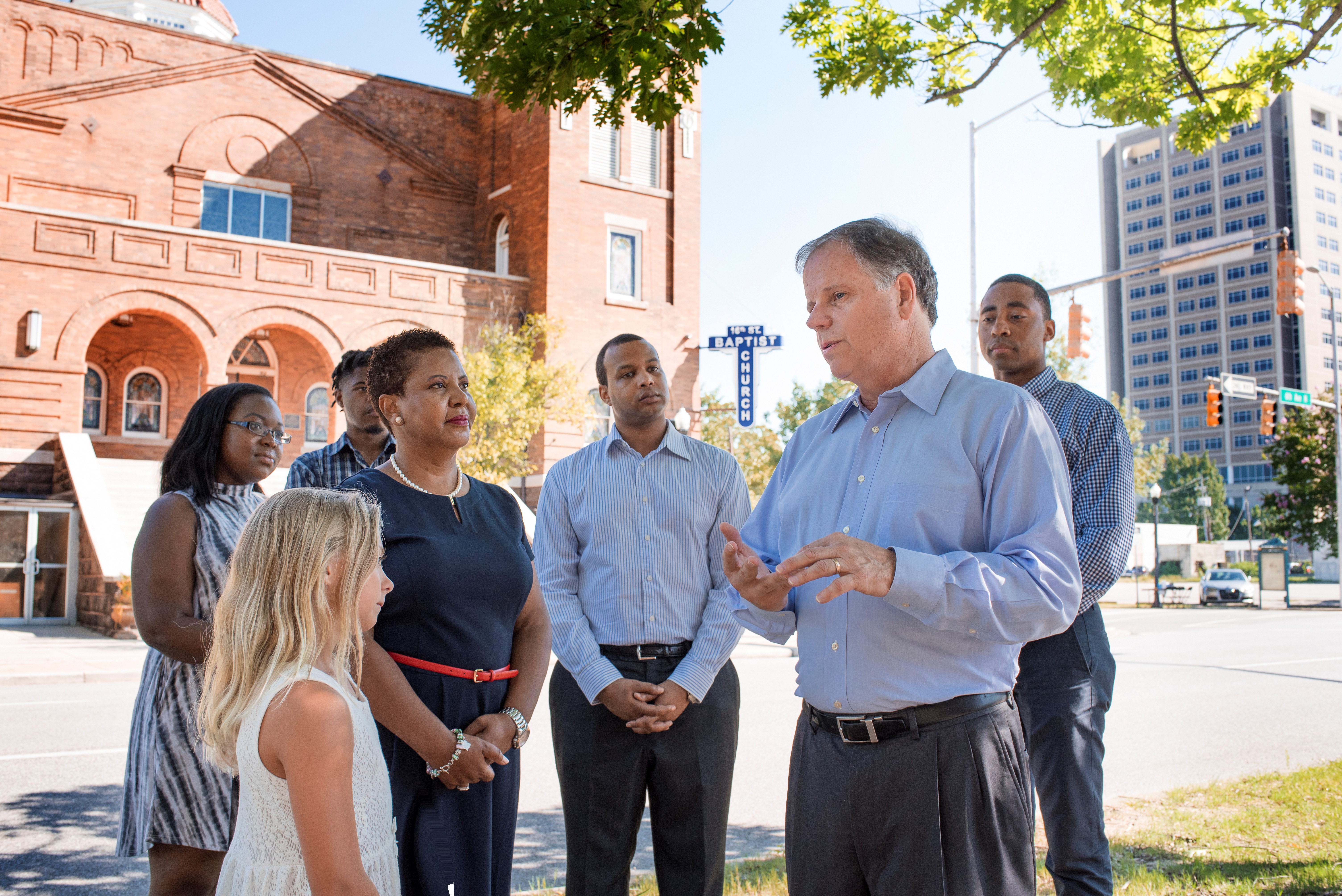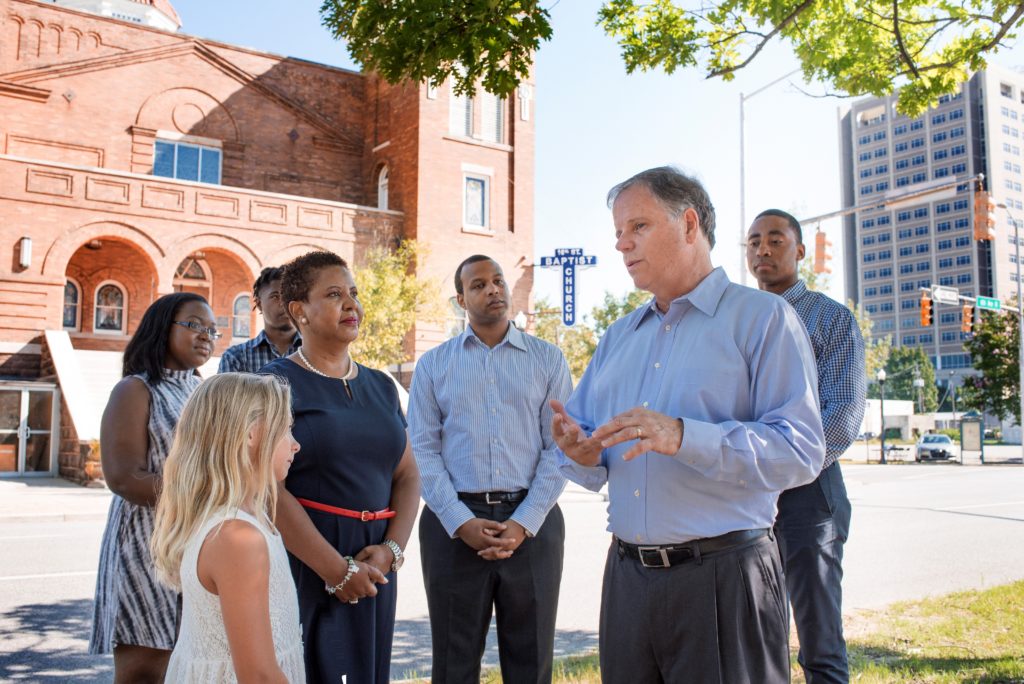
By Kevin O’Leary
The American Prospect

The hill country of northern Alabama holds one of the keys to next week’s special election that will decide if GOP Christian firebrand Roy S. Moore or Democrat Doug Jones joins the U.S. Senate in 2018. Nearly everyone agrees that Jones is a quality candidate and a man of integrity. In the early 2000s, as U.S. attorney he successfully prosecuted the last of the Birmingham church bombers who killed four African American girls in 1963 — a time when white Alabama stood firmly behind then Governor George Wallace trying to derail the civil rights revolution. The Dec. 12 special election to fill the seat once held by Attorney General Jeff Sessions will be the first general Senate election of President Trump’s tenure.
Progressives hope Jones can score an upset against Moore, whose extreme views of religion, the Constitution, and states’ rights led to him being removed as the state’s chief justice by the Alabama Court of the Judiciary, not once but twice (the first time he was removed; the second time he was suspended and then resigned). Recent reports alleging that Moore had lured teenage girls into sexual encounters could increase his vulnerability. Moore has denied the charges.
Moore, backed by the Trump electorate in the September GOP primary fight, crushed “Big Luther” Strange in a show of strength for the Bannon wing of the Republican Party. Because Moore inspires both passionate supporters and detractors within the GOP, Jones’s path to victory involves peeling off moderate Republicans as well as maximizing turnout among Democrats. The contest remains an uphill battle for Jones. What makes the race especially difficult for Jones is how Alabama’s political terrain shifted against Democrats after 2008.
Turning Point
Following the civil rights revolution and the Reagan presidency, Alabama remained Democratic at the state level much longer than its neighbors. Democrats relied on a biracial coalition made up of African Americans, urban liberals, and critically, working-class whites, many unionized, in the hill country of northern Alabama, who continued to vote Democratic as had their fathers and grandfathers. The downhome, blue-collar vote anchored the coalition until President Barack Obama’s 2008 election. Then it fell apart.
“Once Barack Obama was elected, it was, ‘Oh, my God, We’re not that. That’s not us,’” says one Democrat who plays an influential role in state politics. “In 2008, Obama won 14 percent of whites. In 2012, 91 percent of whites voted against Barack Obama, and the other 9 percent—we all know each other.”
Historically predominately white, northern Alabama, a hotbed of the Populist uprising in the 1890s, has long been a Democratic stronghold with a rich labor tradition. Racism continues but until recently it was subdued and latent. The hilly north never had plantations, and thus was home to few blacks.
“People in northern Alabama don’t like blacks, but they don’t know any,” explains the Democratic official. “It’s similar to prejudice against gays.” But once these long loyal Democrats saw the national party “nominate a black or a woman for president, that was it.”
Alabama AFL-CIO President Bren Riley agrees. “Since 2008, the Republicans have done a good job convincing white people that Democrats are the enemy—the party of blacks, and gays, and people who wanted to take your guns. Race relations have come a long way in Alabama, but many white voters could not vote for a black guy for president.” White male identity politics took over as people shifted en masse to the GOP. The challenge for Jones is to bring some of the lunch pail vote home.
Redistricting
In addition to Obama being in the White House, the 2010 redistricting by the new Republican legislature divided the state by racial lines, according to Selma Mayor Darrio Melton. The African American former member of the state legislature says the Republicans packed black districts and reduced the number of minority votes in districts represented by white Democrats. Eroding the biracial coalition on which white Democrats depend, Republicans gained firm control of the state government. Their power play solidified when the Supreme Court emasculated the Voting Rights Act in its landmark Shelby County v. Holder (2013) decision and ruled that southern states no longer needed to obtain Department of Justice preclearance for redistricting plans.
As a result, the Democratic Party in Alabama is increasingly black. This is the landscape on which Jones, a political novice, clashes with Moore, a veteran of four previous statewide campaigns over the past 20 years.
Democrat Marcel Black (who is white) has represented Colbert County in the northwest corner of Alabama in the state legislature for 28 years. In 1996, Bill Clinton defeated Bob Dole 50.3 percent to 40.9 percent in Colbert. But in 2008, John McCain defeated Barack Obama 59.3 percent to 39.1 percent and in 2016, Donald Trump trounced Hillary Clinton 67.2 percent to 29.4 percent.
Racism Still Exists
In the New South of the 21st century, Republicans run more on social issues than race — the abortion issue is big — but racism still exists and often is the subtext. “The unfortunate thing about this country is that we have always had someone to hate — whether it’s Jews or blacks or the Irish or the gays or the Hispanics — and people running for office have taken advantage of this,” Black says. After Obama’s election in 2008 and 2012, “the GOP did much better.” GOP state legislator Mack Butler agrees, “Obama did help grow the Republican Party, not just in Alabama, but across the country.”
In Etowah County in northeast Alabama, home to Democratic state Representative Craig Ford as well as Roy Moore, it is the same story as Colbert. In 1996, Clinton defeated Dole 47.9 percent to 44.8 percent. In 2008 and 2012, Barack Obama only received 30.0 percent and 30.2 percent while McCain received 68.3 percent and Romney 68.4 percent and in 2016 Trump rode to victory with 73.3 percent to Hillary Clinton’s 23.6 percent. Statewide, Ford says, “we lost it all in 2010” and the pendulum has not swung back.
A former minority leader of the state House of Representatives, Ford has survived as a moderate Democrat in rural Alabama, in part by having an A+ rating from the NRA. The owner of two small businesses that employ 20 people, Ford says he understands the concerns of business owners about the cost of the Affordable Care Act. A moderate Democrat who regards Moore as a “right-wing political nut who can’t talk jobs or relate to the economy,” Ford says, “I am for less government and less taxes, but I am for government when I need it. I realize government services require taxes.”
‘Tabletop Issues’
According to Ford, Jones needs to keep chipping away at Moore by talking about “tabletop issues — jobs, the economy, and workforce development.” Having served 17 years in Montgomery following his father (who served 26 years), Ford says, “You couldn’t ask for a more qualified candidate than Jones. He’s a hell of a lot more qualified than Moore.”
No Democrat has won statewide in Alabama since 2006, when Sue Bell Cobb was elected to serve as chief justice of the Alabama Supreme Court from 2007 to 2011. Jones has the civil rights credentials to appeal to blacks; his main challenge is to peel white moderates and traditional conservatives away from GOP reactionaries who see the renegade judge as their perfect tribune.
Montgomery lobbyist Toby Roth was chief of staff for Governor Bob Riley and is a self-described establishment or Chamber of Commerce Republican. His former boss decisively defeated Judge Moore 66 percent to 33 percent when the judge challenged the sitting governor in 2006. Roth is no fan of the former chief justice, but when he looks at the race he believes Moore is the odds-on-favorite to defeat Jones.
“There is a populist thread about sending them a message that goes back to George Wallace,” says Roth. Moore evokes that politics, and Jones has not done anything to establish moderate credentials with the electorate, according to Roth. Instead, “he has gone the other way telling Chuck Todd he was pro-choice up until the moment of birth. This is not good retail politics when a majority of Alabama voters, not just Republicans, are pro-life.” The key to the race is what happens to the moderate Republican vote that went to Strange in the GOP primary. Do they vote for Moore, stay home, or vote for Jones? “How those numbers break out is the key to the election,” Roth says.
‘Enthusiasm for Jones’
Barry Ragsdale, a Birmingham lawyer, says there is a “tremendous amount of enthusiasm for Doug [Jones] among Democratic activists. The resistance now has a focal point.” Jones will run strong in Birmingham and Montgomery, and draw good numbers in Huntsville and Mobile. The problem is “the rest of the state.” The special election is two weeks before Christmas and turnout is expected to be extremely low. If moderate Republicans stay home, the contest will be between an energized Democratic base and Roy Moore’s core voters, who view the election, says Ragsdale, as “a referendum on God, if you will.”
Why does Moore inspire his followers? The political class opposes him and this thrills his base. They see him as a man of honor: a West Point graduate and Vietnam veteran, who twice refused to compromise his principles as chief justice. His followers identify with him and together they are a band of brothers in Alabama’s long history of resistance and independence against the sinister powers in Washington.
There is a Trumpian Teflon quality to Moore that presents a challenge to Jones. That neither Trump nor Moore are of the political class is a major part of their appeal says GOP state Rep. Ed Henry, who traveled the country for President Trump and is one of Moore’s campaign surrogates. “Roy Moore owes no elected body or associations for his success. He depends only on God almighty and the people of Alabama.” Henry says Democrats do better in Alabama when they maintain independence from national Democrats, moderate their social positions, and keep laser focus on the economy and jobs.
To win in post-2008 Alabama, the mild-mannered Jones needs to spark enthusiasm and excitement among his supporters to match the passion of Moore’s faithful. Offering advice to Jones, Montgomery-based GOP pollster Brent Buchanan observes, “He is a nice guy, but he is not compelling in the current environment. If he was sharp and fiery, he’d have a better chance.” On the other hand, the Virginia results suggest that a low-key Democratic candidate might be just what’s needed.




